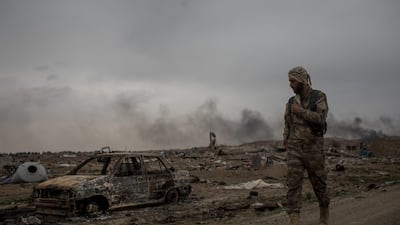The international community must agree on how to bring ISIS fighters to justice after SDF forces captured their last enclave of Baghouz, a senior commander says.
Maj Gen Christopher Ghika, deputy commander of the combined joint task force, said in Baghdad that his organisation and the global coalition fighting ISIS were trying to find fighters responsible for crimes against the Iraqis and Syrians.
“There is a specific strand of work on foreign terrorist fighters that seeks to identify those most responsible and their whereabouts if they are in custody,” Gen Ghika said on Tuesday.
“We need to come to an international consensus on how we deal with those who are responsible for the horrendous crimes of the past five years.”
US-backed Syrian Defence Forces drove the last ISIS fighters from Baghouz on Saturday, declaring a total of 110,000 square kilometres of territory had been freed from the extremist group.
The task force says more than 60,000 ISIS extremists and their relatives had surrendered or fled from Baghouz over the past month.
Gen Ghika praised the forces for a “really excellent job” in separating fighters from non-combatants.
In February, US President Donald Trump called on the joint forces' European allies to take back more than 800 of their ISIS fighters and put them on trial.
Mr Trump said that the alternative was “not a good one, in that we will be forced to release them”.
Gen Ghika said how foreign citizens who travelled to Syria and Iraq to join ISIS should be dealt with was a matter for each country to decide, but more co-operation was an option.
“In the longer term, we probably need to seek an international consensus on a process that holds those who are members of Daesh or who have assisted them to account,” he said. “That may be in the region, it may be elsewhere.
“I think that’s a subject of ongoing discussions. But the basic premise is that foreign terrorist fighters and the policy on what to do with them must be the preserve of sovereign national governments.”
The SDF has called for international support in establishing a special tribunal in Kurdish-controlled north-eastern Syria for the 5,000 foreign and domestic ISIS fighters who have been captured since January.
"The Kurdish administration in north-east Syria has appealed to the international community to shoulder its responsibilities towards members of the terrorist organisation detained by Kurdish security forces," it said last week.
"But unfortunately, there was no response."
The question of what to do with ISIS family members and non-combatants, many of whom are being kept in Al Hol camp, remains.
“Many civilians evacuated from Baghouz are family members of Daesh terrorists and they willingly subscribed to Daesh’s radical ideology”, Lt Gen Paul LaCamera, commander of the US-led coalition, said at the time.
“These family members will not easily abandon their ideology. Their reintegration into society will require a collective effort from the coalition and international community to help to eliminate conditions that would allow Daesh to re-emerge.”
The risk is that ISIS will try to evolve into an underground organisation, Gen Ghika said.
“They’re going to try and become a group that uses insurgent tactics to attack the stabilising forces of the state, to undermine efforts of reconstruction and stability, and to attack the population,” he said.
Gen Ghika said that the best way of battling that risk was to support the Iraqi security forces and SDF in rooting out ISIS members and supporters.


